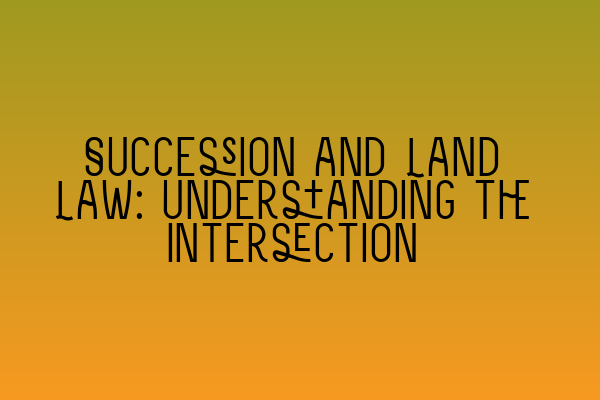Succession and Land Law: Understanding the Intersection
When it comes to property law, understanding the intricate relationship between succession and land law is essential. Whether you are a property owner, a solicitor, or a legal professional, having a clear understanding of these areas will enable you to navigate the complexities of property transactions and disputes.
In this blog post, we will explore the intersection of succession and land law, highlighting key concepts and principles that are crucial for anyone involved in property matters.
What is Succession Law?
Succession law deals with the transfer of property rights upon the death of an individual. It governs the distribution of a deceased person’s assets, debts, and property among their heirs or beneficiaries. The primary purpose of succession law is to ensure a smooth and fair transfer of property rights, safeguarding the interests of both the deceased and their successors.
Understanding succession law is particularly important in the context of property, as it determines who inherits and becomes the legal owner of real estate upon the death of the original owner.
Land Law and Succession
Succession law has a direct impact on land law, as it determines the transfer of property rights from the deceased to their successors. When a property owner passes away, their property becomes part of their estate and is subject to succession laws.
Land law governs the rights and obligations associated with land ownership. It encompasses various aspects, including property rights, conveyancing, leases, and land registration. In the context of succession, land law comes into play when the deceased’s property is transferred to their heirs or beneficiaries.
Succession and land law intersect in multiple ways, some of which are outlined below:
Devolution of Property
Succession law determines how property is devolved or transferred from the deceased to their successors. The laws governing the devolution of property may vary depending on the jurisdiction and the existence of a valid will. In cases where the deceased left a will, the property follows the testator’s wishes as specified in the will. In the absence of a will, the property is distributed according to the laws of intestacy.
It is crucial to consider both succession and land law when dealing with the transfer of property, as compliance with the legal requirements is essential to ensure a valid and enforceable transfer.
Rights and Interests in Property
In the context of succession and land law, it is important to identify and understand the various rights and interests that may exist in a property. These rights and interests may include ownership rights, easements, mortgages, and leases.
When a property passes through succession, it is crucial to determine the nature of these rights and interests and how they may be affected by the transfer. For example, if the deceased had leased the property, the lease may continue to be binding on the successor, subject to certain conditions and legal requirements.
Sale and Disposition of Property
Succession and land law also intersect when it comes to the sale and disposition of property. In some cases, the successors may decide to sell the inherited property. However, it is essential to ensure that the legal requirements for selling property are met, which may include obtaining necessary consents, complying with any restrictions or covenants, and conducting proper conveyancing.
Understanding the legalities surrounding the sale and disposition of property is essential to avoid any legal disputes or challenges that may arise in the process.
Conclusion
Succession and land law are closely intertwined in the realm of property law. The transfer of property rights upon the death of a property owner depends on the principles and rules governed by succession law. By understanding the intersection between succession and land law, you can ensure compliance with legal requirements, protect your interests, and navigate property transactions and disputes more effectively.
For further resources related to property law and preparing for the SQE exams, we recommend checking out the following articles:
